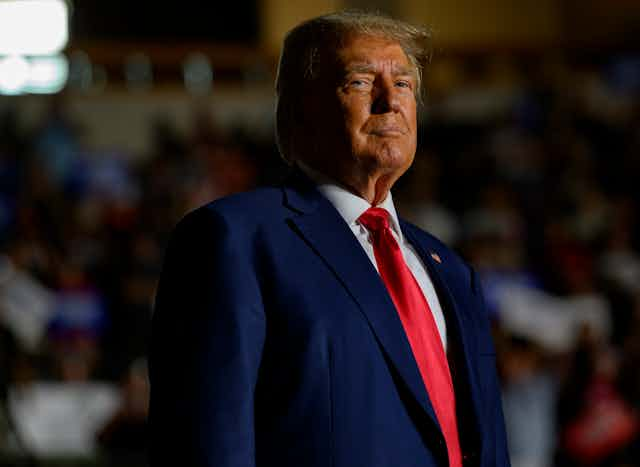Donald Trump has declared, “I am your retribution,” and it appears to be a guiding theme of his 2024 campaign.
He now faces a total of three indictments, following Special Counsel Jack Smith’s announcement on Aug. 1, 2023 that Trump had been charged with four counts in his effort to overturn the 2020 presidential election – the most serious charges so far. There’s likely to be an additional indictment from Fulton County, Georgia, prosecutor Fani Willis.
If elected, he promises to punish his perceived enemies – everyone from prosecutors at the Justice Department and in New York and Georgia to the Biden family and Republicans in Congress who don’t help him.
Trump and his allies are ramping up their rhetoric, playing the victim card with cries of “witch hunt” and making promises to use the machinery of government to punish anyone who has attempted to hold Trump accountable.
While appeals to grievance have been used in presidential campaigns, never before in American history has a leading contender for a major party’s nomination made their personal grievances related to criminal liability and payback the centerpiece of their presidential run.
Is a campaign based on grievance and retribution likely to sway voters? And what are the implications if Trump wins back the White House?
As scholars who study democracy, voting behavior and political corruption globally, we note that while the politicization of prosecutions is becoming increasingly common in other democracies, it can be hard to figure out how these dynamics affect elections.
Political muscle can trounce a prosecution
Candidates under investigation can leverage their political muscle to run for office – and as a means to avoid prosecution.
In Kenya’s 2007 presidential election, Uhuru Kenyatta and William Ruto were two prominent politicians backing opposing coalitions that engaged in post-election clashes after allegations of vote rigging.
Members of both factions were investigated, and Kenyatta and Ruto were personally charged with organizing the violence among their supporters. Their cases were referred to the International Criminal Court, or ICC, after the Kenyan government slow-rolled local prosecutions.
But as the cases dragged on, these erstwhile enemies forged an electoral alliance to win the 2013 contest. Kenyatta ran as president and Ruto his deputy, by – ironically – pushing a “peace narrative” during the campaign.
This flexing of political muscle, a crusade questioning the ICC’s legitimacy and grassroots mobilization led to their eventual victory. That essentially ended their legal woes internationally and domestically. The ICC dropped charges, and they were reelected in 2017.

Undermining accountability
Should Trump win, he can appoint an attorney general who will follow his bidding and suspend prosecutions brought by the special counsel, or he can simply pardon himself of federal charges.
He can further seek to avoid trial or imprisonment by invoking a Department of Justice rule that presidents cannot be under federal criminal indictment or in jail while they serve in office, although a candidate can run for president and be elected under indictment or from jail. A novel legal strategy for Trump would be to try to apply this also to state jurisdictions like New York and Georgia.
Any attempt to challenge the constitutionality of such actions – pardoning himself, dismissing the special counsel, ending state and local indictments – would no doubt end up at the Supreme Court. The court majority is conservative, suggesting it might rule in Trump’s favor. Additionally, precedent and legal scholarship also suggest that the court would deem at least some of these actions constitutional.
Beyond ending immediate prosecutions, victorious candidates can use winning office to further erode democratic institutions and the rule of law.
Benjamin Netanyahu in Israel has served as prime minister during his own corruption trials. After losing office in 2021, he came to power again in 2022 while under indictment.
Netanyahu and his allies in parliament have pursued legislation to weaken the independence of the Supreme Court, a portion of which was recently passed by the legislature. He and his allies have promised to go after the former attorneys general and other prosecutors overseeing Netanyahu’s criminal cases. The attempts to diminish the Supreme Court’s power have resulted in months of anti-government protests.
Trump and his campaign view a 2024 win as an opportunity to significantly increase the power of the executive branch to go after a “deep state” that has investigated Trump and his allies. That potentially undermines the independence and functioning of everything from the State and Justice departments to local law enforcement.
Comebacks follow prosecutions

Examples from other countries show that prosecution or even jail time does not prevent former leaders from mounting comebacks.
Former Brazilian President Luiz Inácio Lula da Silva was elected once again in 2022 after his conviction and imprisonment. He argued that a judge who was in cahoots with prosecutors, and who became Lula’s predecessor’s justice minister, revealed the politicized nature of Brazil’s justice system. That allowed him to play the victim card successfully at the ballot box.
Trump is innocent until proved guilty. His hard-core “Make America Great Again” supporters tell pollsters they believe in his complete innocence. We expect this is not likely to change, regardless of evidence prosecutors show to a jury and what those juries decide.
But if the facts of the cases and evidence presented at trial appear to moderates and independents as nothing burgers, or if swing voters otherwise feel the judicial process has unfairly targeted Trump with prosecutorial overreach, that could conceivably turn Trump’s persistent unfavorable ratings into electoral victory.
Recent polling makes clear that while Trump has consolidated support for the Republican nomination among the MAGA crowd, nearly half of Republicans surveyed are still considering other options.
In any event, his platform of victimization and retribution shows no signs of abating. Whether enough Republicans will turn out to vote and moderates swing toward Trump, and whether enough Democrats decide to stay home, suggest that this is still a very high-risk strategy for Trump, but if successful, likely to reward him with time away from jail.

